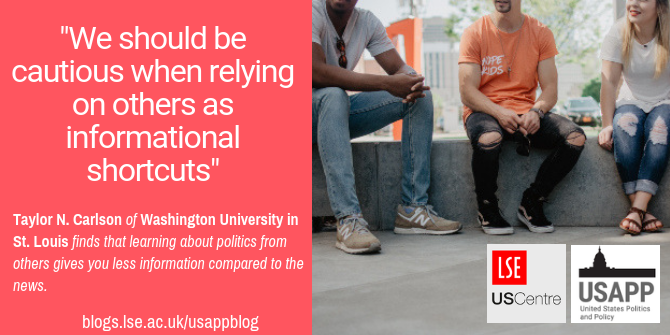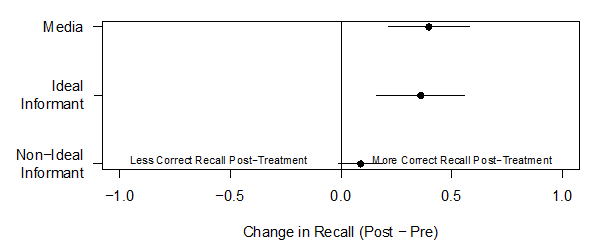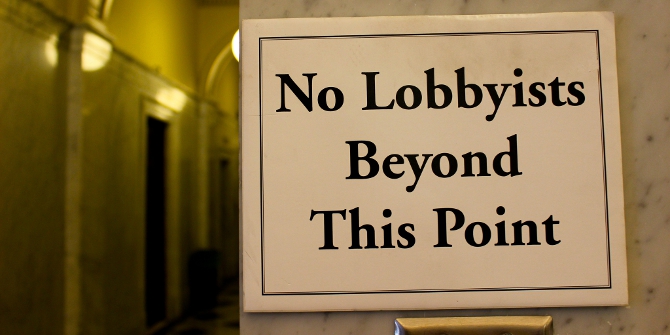 Despite the explosion of news sources now available, many Americans rely on conversations with others to learn about politics. But how does the information communicated by our peers differ from that communicated by the media, and does it matter? In new research, Taylor Carlson finds that information becomes more sparse and more biased in favor of personal preferences as it flows from the media to person to person. As a consequence, those who rely on others for political information learn less than those who rely directly on the media, unless individuals turn to someone who is more knowledgeable and from the same political party.
Despite the explosion of news sources now available, many Americans rely on conversations with others to learn about politics. But how does the information communicated by our peers differ from that communicated by the media, and does it matter? In new research, Taylor Carlson finds that information becomes more sparse and more biased in favor of personal preferences as it flows from the media to person to person. As a consequence, those who rely on others for political information learn less than those who rely directly on the media, unless individuals turn to someone who is more knowledgeable and from the same political party.
We can now learn about politics from countless sources. And we might think that this increased access to information is a good thing. People could use this information to make informed voting decisions and hold elected officials accountable. But in reality, it is exhausting to sift through everything that’s out there to find what is useful. One shortcut Americans use is to simply rely on other people – over breakfast, at work, at the bar or anywhere – to do that grunt work for them. As of 2014, about 65 percent of Americans report that they learn about politics via word of mouth.
Is the information we learn from others different from information directly from a news source? Yes. As individuals summarize news articles for others, they are more likely to pass on information that resonates with their cognitive biases, making the content shorter, less precise, and more biased in favor of individuals’ preferences. Does it matter? Also yes. In new research, I show that individuals who learn about politics from another person learn less about politics than those who learn directly from the media, unless individuals learn from someone who is more knowledgeable than they are and belongs to the same political party.
These findings come from two online experiments. The first experiment is inspired by the childhood game of “telephone.” I asked participants to read a news article and write a message telling someone else about that article. Participants read a Reuters article about US economic performance in the first quarter of 2017, based on the report from the Bureau of Economic Analysis. Participants were randomly assigned to write a message telling either a Republican, Democrat, or Independent about the article that they read. I analyzed these messages to see how the information changes as it flows from the original report, to news coverage, to other people. I used a method which is similar to plagiarism detection to look at how the content, based on the words used, changed.
The results, shown in Figure 1, tell us that news articles use much more similar words to the original government report than do messages written by the study participants. One interpretation of this is that when we summarize the news for our peers, we change the content much more than when journalists summarize official reports. Working with a team of research assistants to hand-code the data, we found patterns consistent with previous research: the summaries were much shorter and less precise than were the news articles. We also found that Republicans wrote about the economy more positively, while Democrats wrote about it more negatively. This makes sense given that the article was about economic performance during President Trump’s first quarter in office. Although participants read an article from a non-partisan source, this result echoes findings that conversations can amplify the effect of partisan media bias.
Figure 1 – Similarity distribution for official reports, news articles, and social messages

The next important question is whether this changing content affects our political knowledge and attitudes. To test this, I conducted a second experiment on a nationally representative sample in which I randomly assigned some people to read the Reuters news article that the first set of participants read or one of the summaries generated by a participant in the first study. This procedure was designed to approximate, albeit imperfectly, the difference between receiving information by reading a news article or receiving it via word-of-mouth.

Photo by Kate Kalvach on Unsplash
The results, shown in Figure 2, tell us that those who read the full news article learned significantly more (measured by a quiz) than those who read someone else’s summary of that article. An exception is when individuals received information from someone who was more knowledgeable and from the same party. In this case, they learned the same amount as those who read the full news article. This supports previous research suggesting that we should be able to rely on our peers as information shortcuts if they are more knowledgeable than us and share our partisanship, making them an “ideal informant.” When it comes to opinions, I found that those who read the news article thought the economy was doing worse, but those who read a summary did not update their beliefs at all.
Figure 2 – Information recall by group

As with all research, my study is not without its limitations. I examined one topic (economic performance) that, compared to others, was not particularly exciting. It also does not reflect actual conversations, when people interact with those they know personally, ask follow-up questions, or perhaps process the information more fully. Still, my work is an important step forward in helping us understand the ways in which information from our peers can differ from that communicated by the media—and importantly—how relying on our peers might help or hurt our ability to engage with politics.
One takeaway point is that we should be cautious when relying on others as informational shortcuts. My research suggests that finding knowledgeable people who support the same political party might be the key to saving time sifting through the news on our own. However, some work suggests that we tend to overestimate our peers’ knowledge levels, meaning that we might think we’ve found an ideal informant when in reality we haven’t. Relatedly, some of my ongoing work with Jaime Settle suggests that individuals are uncomfortable (and thus avoid) talking about politics with those who are more knowledgeable. Learning from others might be easier said than done.
- This article is based on the paper, ‘Through the Grapevine: Informational Consequences of Interpersonal Political Communication’ in American Political Science Review.
Please read our comments policy before commenting.
Note: This article gives the views of the author, and not the position of USAPP – American Politics and Policy, nor the London School of Economics.
Shortened URL for this post: http://bit.ly/32iWCoI
About the author
 Taylor N. Carlson – Washington University in St. Louis
Taylor N. Carlson – Washington University in St. Louis
Taylor Carlson is Assistant Professor in the Political Science Department at Washington University in St. Louis. She studies political communication, political psychology, and race/ethnicity in American Politics. Her research focuses on understanding the content and consequences of interpersonal political communication.






